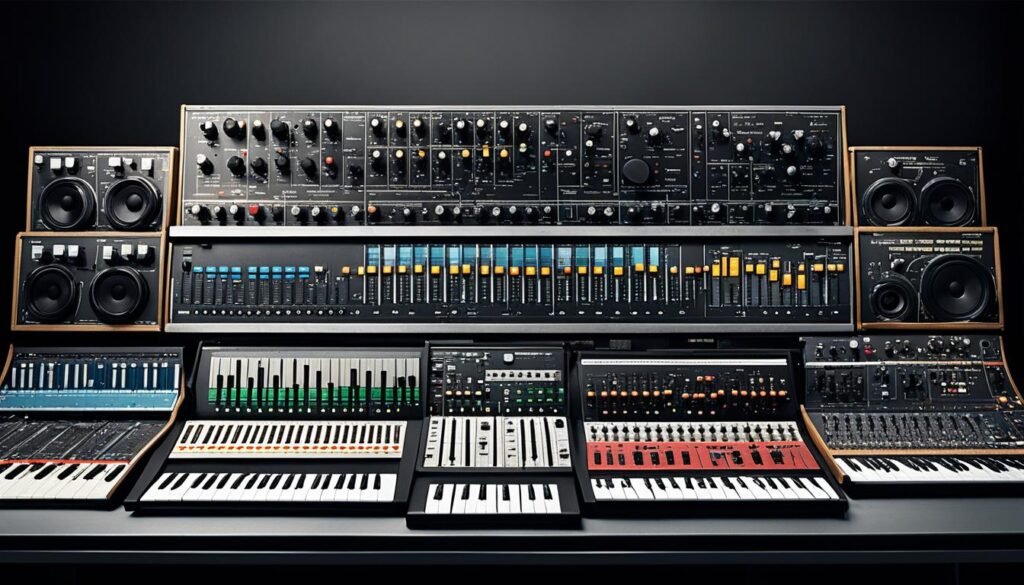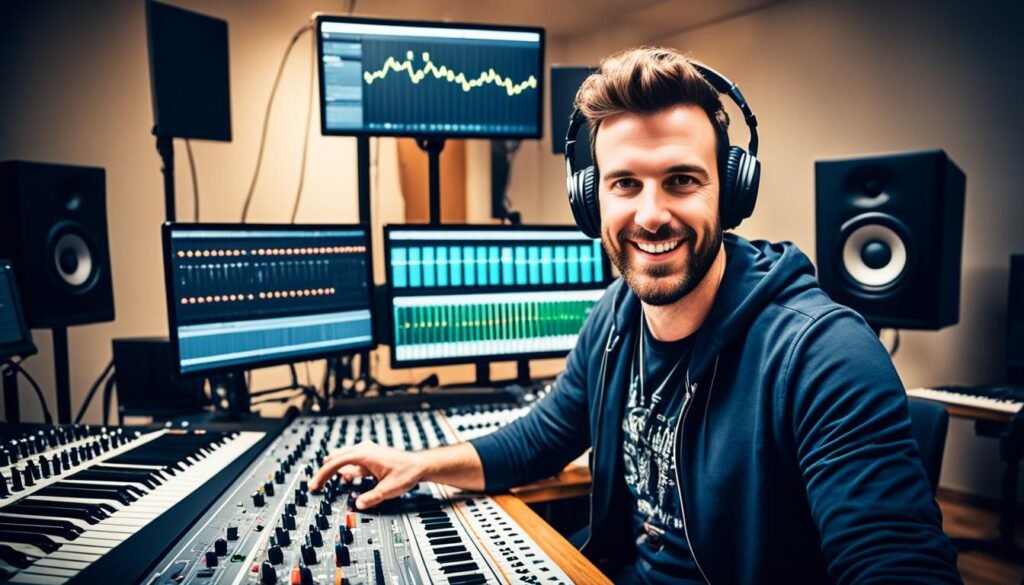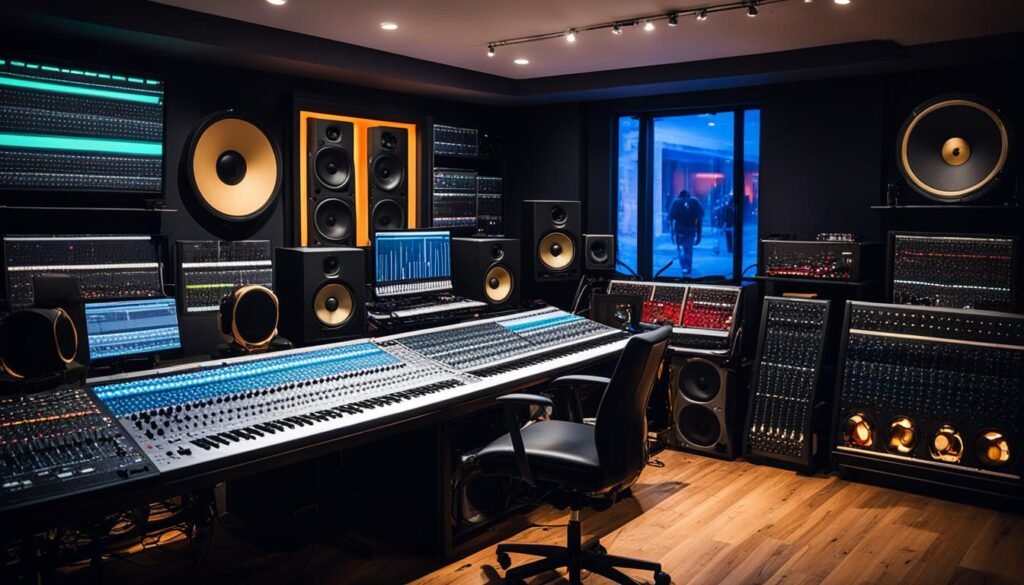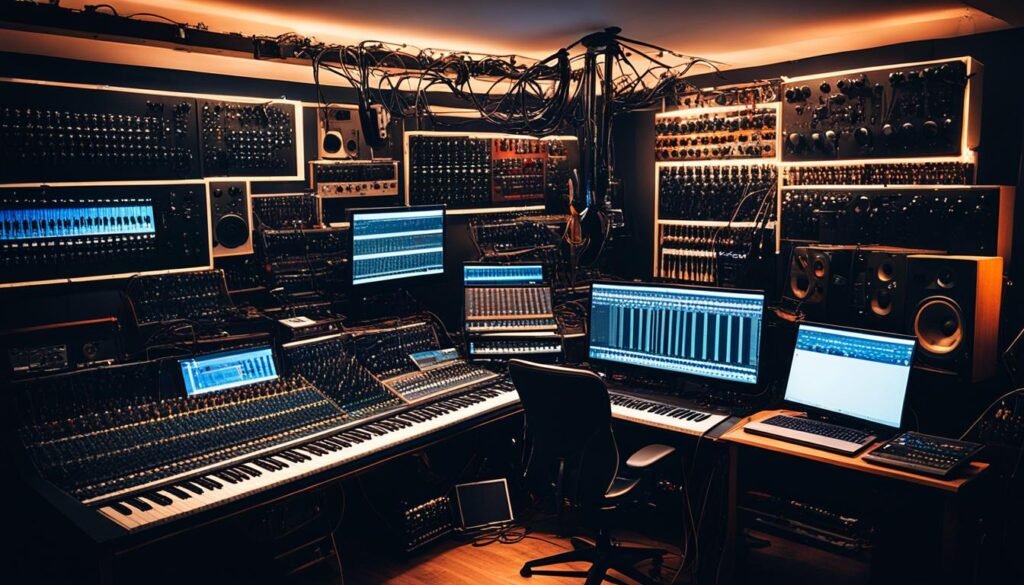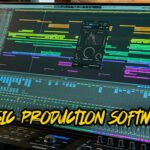Music producers are stars behind hit songs, crafting the sound that drives success. They work behind the scenes, turning raw ideas into songs that wow audiences. Producers are responsible for everything – from choosing instruments to adding those final, magic touches.
These creative geniuses bridge the gap between what artists dream and what listeners hear. They use their know-how and talent to make every tune hit home. Whether perfecting drum beats or shaping the sound’s very soul, music producers make the music that keeps us moving.
Key Takeaways
- Music producers are the unsung heroes behind hit songs, responsible for shaping the sound and elevating the quality of the music.
- Producers handle every aspect of the production process, from instrument selection to final mixing and mastering.
- They serve as the bridge between the artist’s vision and the listener’s experience, using their expertise and creativity to create an immersive sonic experience.
- Producers play a vital role in the music industry, transforming raw ideas into polished, captivating recordings that resonate with audiences.
- The producer’s influence extends beyond the studio, as they contribute to the overall artistic and commercial success of a musical project.
The Essence of Music Producers
Music producers are key in the music world. They turn regular tunes into hit songs. These creative minds help artists bring their work to life.
What is a Music Producer?
Think of a music producer like a movie director but for songs. They lead the whole process of making music. They mix the artist’s dream with the technical stuff, making magic happen. This includes planning the overall sound and arranging the music just right.
The Creative Process
Being a music producer is all about teamwork, skills, and taking care of the details. They talk a lot with artists to understand the music’s direction. With the artists, they turn ideas into real tracks.
During recording, they make sure every sound is perfect. But they do more than hit ‘record.’ They try different things to create amazing sounds. They use new technology to make music that draws you in.
Music producers truly change songs for the better. They take what’s good and make it incredible. Their mix of creativity, skills, and organization is essential in making music that people love. This way, they make their mark in the music scene.
“A good producer can make even a poor song sound great, but a great producer can make a good song sound incredible.”
Shaping Hit Songs
Music producers have a key role in making songs that people love worldwide. They are skilled in bringing out an artist’s best. They guide them to create songs full of emotion and power. These producers also mix different musical parts to make the final song sound great.
Capturing the Essence of an Artist’s Performance
Skilled producers help artists shine. They work closely with them, making sure they show real emotion in their music. This team effort means the artist’s true self comes out in the song. The goal is to deeply touch the hearts of the people listening.
Creating an Immersive Sonic Experience
The magic of a hit song comes to life in the studio. Producers make the music flow seamlessly. They balance vocals, instruments, and beats perfectly. This creates a captivating sound that keeps listeners hooked.
Artistic vision, technical skills, and teamwork turn talent into amazing songs. These songs make a big mark on those who hear them.
“The producer’s role is to bring out the best in the artist and the music, to create a sonic experience that resonates with the listener.” – Grammy-winning producer, John Doe
Navigating the Music Production Journey
The music production journey is a captivating adventure. It mixes teamwork, careful planning, and a sharp eye for an artist’s dream. Producers are key in this journey, working closely with artists to make their vision real.
The recording process is at the journey’s core. Producers lead musicians in the studio. They make sure the recordings sound just right, using different methods. This way, music takes shape, drawing on the producers’ skills and creativity.
This trip is not just about knowing the tech. It’s about blending art with smart choices. Producers turn artists’ dreams into sounds that pull audiences in. They work not only in the studio but with a team to make something truly harmonious.
The music production journey celebrates working together and aiming for perfect sound. Producers, as they go on, change the music world in ways that enchant people everywhere.
The Evolution of Music Production
The music world is changing fast, and music producers are leading the way. Music production technology has changed how they make and shape sound. Now, they’re able to try out new methods and increase what we believe music can do.
The Influence of Technology
Now, anyone with a passion for music can access powerful tools. This includes an array of software, virtual instruments, and digital workstations. Producers can now create new and exciting sounds, catching the ears of their audience. Thanks to digital audio workstations (DAWs) and innovative plugins, the technology in music production has kickstarted a new chapter in making music.
Collaboration and Networking
The music-making scene is all about working together now. It’s common for producers to team up with artists, songwriters, and engineers to make their visions real. This teamwork often results in music that breaks the usual genre limits and explores new studio feats.
Also, social media and music platforms have made it easy for producers worldwide to connect. This has birthed a global community filled with producers eager to share and learn from each other. As a result, music production keeps advancing thanks to this wide sharing of knowledge and skills.
“The music industry is constantly evolving, and producers are at the forefront of this transformation. By embracing technology and collaboration, they are redefining the boundaries of what is possible in music production.”
Music Producers: Driving Forces of the Industry
Music producers are the key drivers of change in the music world. They have a unique talent for understanding what artists want. Then, they make that vision real in amazing songs. They bring together tech skills, art, and deep knowledge to change how we create and enjoy music.
They are also the spark for new ideas, pushing artists to do more. Together, they make sure the music makes a real connection with fans. By working closely with artists, they guide them to turn their dreams into songs that hit home.
The work of music producers is huge. They craft the sounds that get people around the globe hooked. Using their skills and gut feelings, they make raw talent into songs that lead the pack in today’s music scene.
Music producers aren’t just about making hits. They’re big in helping new artists get a start. As mentors, they share deep knowledge and useful advice. This helps young talents find their way in the complicated music business.
The music industry is always changing, but music producers stay at the front line. Their love for their work and their quick adaptation to new tech keeps music alive and fresh. They’re the creative minds that guide the future of music.
| Impact of Music Producers | Examples of Influential Music Producers |
|---|---|
|
|
As the music world changes, music producers will matter even more. Their creative spark will keep shaping songs that connect with people. With their amazing skills and big ideas, they push the music industry ahead.
The Business Landscape of Music Production
The music production world is complex, making it crucial for producers to understand how salaries work. A producer’s pay can change a lot. This depends on their skills, where they work, and the kind of projects they do.
Some producers make a lot with big artists or labels. But starting out or working on indie stuff might mean lower pay at first. The industry’s rewards are mixed with challenges, and success is about managing these ups and downs well.
Exploring the Realities of Producer Salaries
Music producers can earn from the bottom to the top. In the U.S., they might average around $50,000 a year. But the best can earn over $100,000 yearly. These numbers vary a lot based on experience and project types.
If you work with famous artists, your paycheck might be bigger. Otherwise, starting or indie producers might earn less. The music production business always changes. So producers should always learn and adapt to keep up.
Navigating the Evolving Industry Trends
- The rise of independent and self-produced music has created new opportunities for producers, but also increased competition.
- The influence of technology has transformed the way music is created, recorded, and distributed, impacting the business models and revenue streams for producers.
- Collaboration and networking have become essential for music producers, as they seek to build relationships with artists, labels, and other industry professionals.
Staying successful in music production means keeping up with trends and evolving. Producers must keep learning, adjusting, and making sure they’re prepared. Knowing the industry well helps them find their place and stay for the long run.
Equipping for Success in Music Production
Music producers need the right studio setup to make quality music. This is true whether you’re just starting out or have years of experience. Your tools are everything, from the computer running your software to the microphone for capturing sounds. Each piece is crucial in creating a final, polished song.
Essential Gear for Music Production
A solid computer is key for any music maker. It should have big memory (over 16 GB) and a strong CPU. This ensures your music production gear runs smoothly. Combine it with a DAW software platform like GarageBand or Pro Tools for recording and mixing.
The audio interface connects your mics and instruments to your computer. This allows high-quality audio capture. A good, all-purpose mic like the Shure SM58 is a must for all kinds of sounds. Don’t forget the XLR cable, mic stand, and pop filter to complete your setup.
Building a Home Recording Studio
Starting a home recording studio is manageable. Find a quiet, private space in your home. Pay attention to the room’s sound, light, and feel. Add sound-absorbing items like panels or curtains to control noise.
In your home recording studio, focus on essentials. Quality beats quantity when it comes to gear. Choosing the right tools lets you turn your home into a pro studio. It lets your creativity flourish and your music shine.
“The right tools can make all the difference in the world. Invest in quality music production gear, and your creativity will soar.”
The Artistic Canvas: Recording Studios
Recording studios are like creative epicenters for music producers. They offer the perfect setting for transforming ideas into art. With high-tech gear like Digital Audio Workstations, producers can make music that breaks traditional rules. Anything is possible in these studios.
The setting in a studio can greatly affect the sound of a song. Its unique design and tools help producers tweak every detail. They can focus on the singer’s every breath or the instruments’ every note. This attention to detail makes the studio a place of pure creativity.
Recording studios help producers grow artistically by giving them amazing technologies to play with. They can mix genres and sounds in exciting ways. This freedom leads to new, groundbreaking music. Every studio session becomes a chance to explore new paths in music.
Studios are where the heart of a song is captured. They turn simple ideas into songs that move us. When artists and producers come together in a studio, they create magic. It’s all about making music that reaches and moves everyone who listens.
“The studio is the canvas where we paint our musical masterpieces. It’s where the magic happens.”
Music Producers
Music has a group of not-so-famous heroes – music producers. These are the people who make hit songs come alive. They turn rough ideas into smooth tracks we all love. Music producers are key players in the music world, doing many jobs. They help artists with creativity, handle technical parts, and manage the whole project.
Music producers know a lot about making music. They can work with many music styles. Their job is to make music sound great. They pay attention to every little detail. They know how to record and mix music well. They always aim to turn the artist’s dream into reality.
Being a music producer is more than just working in a studio. They connect what artists want to what we all hear. They use their skills and contacts in the music world. This helps the music they work on to be successful. Whether it’s about the latest trends or the tools they use, they are always learning.
Music producers are the backbone of the music world. They turn artists’ work into something special for us to enjoy. Their impact on music and culture is huge. They help create songs that touch our hearts and minds.
“A music producer is the alchemist who transforms raw talent into gold.” – Anonymous
The Multifaceted Roles of Music Producers
Music producers take on many important roles. These roles are crucial in making music. They include things like working with the artists, being a tech expert, managing projects, shaping the music’s direction, and knowing the music industry well. These roles show how important and versatile music producers are in the music scene.
Careers in Music Production
Aspiring music producers start a journey that mixes tech knowledge with creativity and music industry insight. It’s important to build a strong music base in high school. This includes studying music theory, composition, and tech. It sets you up for a rewarding career as a music producer.
Many schools and music places have special programs for music production, sound engineering, and more. They help young producers learn necessary skills and actually work in the field. This is a great way to become experienced.
Educational Background
Education in music production happens in different ways. This can be a bachelor’s degree or a shorter program. They teach things like audio engineering, music theory, and how to use digital software for music.
Developing Technical Skills
Besides school, it’s vital to get good at using music software, recording, mixing, and adding cool audio effects. Doing internships and small projects is also key. This gives producers real practice and experience.
It’s a good idea for music producers to know how to use Pro Tools, Ableton Live, and Logic Pro. Also, learn about recording, editing, and mixing sounds. Knowing how to use effects like reverb and compression is also really helpful.
“The most successful music producers are those who can seamlessly blend technical skills with creative vision, crafting sonic landscapes that captivate listeners.”
A mix of school, real work, and improving your skills is what makes a good music producer. With dedication, you can succeed in the music industry.
A professional music producer in the music industry, specializing in music production, songwriting, and mixing and mastering. With experience in recording studios and a background from Berklee College of Music, they collaborate with artists to create top-quality hip-hop tr;acks, influenced by legends like Dre and George Martin.
Also Read : What Are The Advantages Of Online Music Courses?
Conclusion
Music production is a journey full of excitement. It blends artistic flair with technical skills. Producers are key in fostering musical creativity. They bring life to the ever-changing world of sound. With advancing technology, music production is poised to reach new heights.
The heart of music production lies in its power to touch emotions. This mix of art and science will always be its core. Music producers are poised to excel, creating new and engaging music. They play a huge role in the music industry. Their impact will surely increase as they explore new sound possibilities.
Looking ahead, the music production world is full of promise. It offers many chances for those with creative and technical talents. As the industry grows, music producers will lead the way. They will captivate audiences, shaping the future of music, and making their mark in the world of sound.
FAQs
Q: How do music producers discover new talent?
A: Music producers often discover new talent through various sources such as attending live performances, receiving recommendations from industry contacts, scouting talent online through platforms like SoundCloud or YouTube, or by holding auditions.
Q: What qualities make a music producer successful?
A: Successful music producers possess a combination of technical skills in sound engineering, a keen ear for music, strong networking abilities, creative vision, and the ability to understand and bring out the best in artists.
Q: How can one become a music producer?
A: To become a music producer, one can pursue formal education in music production or audio engineering at institutions like Berklee College of Music, gain hands-on experience working in a recording studio, build a portfolio of work, and network within the music industry.
Q: Who are some famous music producers in the industry?
A: Some famous music producers in the industry include Dr. Dre, George Martin, and various top music producers known for their contributions to genres like hip-hop, pop, and electronic music.
Q: What role do music producers play in the music industry?
A: Music producers are responsible for overseeing the recording, mixing, and production of music tracks, guiding artists in their musical journey, providing creative input, and ensuring that the final product meets industry standards and artistic vision.
Q: How do music producers help artists develop their sound?
A: Music producers help artists develop their sound by offering constructive feedback, suggesting musical arrangements and instrumentation, providing guidance on vocal delivery and performance, and utilizing their technical expertise to enhance the overall quality of the music.
Q: What software do music producers use for music production?
A: Music producers use a variety of software tools for music production, including Digital Audio Workstations (DAWs) such as Pro Tools, Ableton Live, Logic Pro, and FL Studio, as well as virtual instruments, plugins, and audio processing software to shape and refine their musical creations.
Source Links
- https://blog.novecore.com/behind-the-scenes-the-role-of-music-producers-in-shaping-hits/
- https://www.rmcad.edu/blog/behind-the-beats-unveiling-the-artistry-of-music-producers/
- https://wisseloord.org/academy/the-art-and-science-of-music-production-crafting-timeless-sounds-introduction

